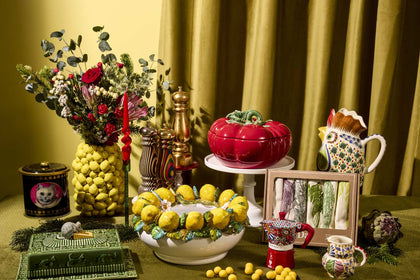
Wild Garlic Spaghetti Recipe
-
20 minutes prep time
-
10 minutes cook time
-
Easy

There's a tremendous joy to foraging - marking the passing seasons, discovering something forgotten just nine months before, and memories replete with a pungency found only outdoors, seeking with friends. Each time I enjoy wild garlic I remember the friend who moved here from America, and first got to know walking down a disused railway line, trying not to slip down the muddy sidings hunting for garlic, both laughing as the dog tried to carry a tree home with us.
The early morning jogs seeing the graffiti change, picking stems and carrying them back to share in the office for lunch. The little river through a wood carpeted with the proud green leaves, bobbing ears of thousands of green Easter bunnies - just close enough to another friend's house where I hope she is free for me to pop past for a glass of wine.
Wild garlic can be sharp and vegetal when raw, although conversely some complain it's too mellow when cooked. The flavour also depends on the maturity of the plant, and whether it's in flower. I like the garlic wilted, but not too much. A touch of sugar in a pesto will help. To make sure we fit in all our greens, I've added some monks' beard by way of marshy contrast. If it's all a little too 'green sea monster' then leave it out - and the lemon zest as well.
What parts of wild garlic do you eat?
There are three parts to wild garlic: leaves, flowers and the fruit/seeds. Every part of the wild garlic plant is edible!
What can you do with wild garlic?
Wild garlic leaves have many uses. They are long and oval in shape, with a strong garlic scent. You can use them in a pesto as we’ve done here, turn them into salsa verde, add to homemade mayonnaise for a kick of flavour, or use in place of spinach when making soups.
The small, white flowers are perfect for decorating dishes, especially as a garnish for salads. They have a delicate garlic flavour.

Towards the end of wild garlic season, the flowers are replaced with small pods. These small green seeds can be removed from the stalks and mixed through mayonnaise for a take on tartare sauce, pickled in cider vinegar and served with cheese, or sprinkled over a salad. You can also keep the wild garlic stalks and add to stir fries.
Can you freeze wild garlic?
Wild garlic season doesn’t last long, and in order to make your foraged finds last longer, you can freeze the leaves to use at a later date.
To freeze the wild garlic, it’s best to blanche the leaves first, and then drain and pat dry. You can even squeeze it into balls like frozen spinach, and space out on a parchment-lined baking tray to freeze. Once the balls are frozen, just tip the portioned wild garlic into a bag and keep in the freezer to use when needed.

Ingredients for Wild Garlic Pesto Serves: 2
- Large bunch of wild garlic leaves (all the stems I can clutch as a bunch in one hand makes 500ml pesto)
- Handful blanched hazelnuts
- Olive oil
- 1 tsp sugar (optional)
- Salt
- Pepper
Method for Wild Garlic Spaghetti
- Fill a large mixing bowl with water, add the wild garlic leaves, and swirl to remove dirt. Strain, and dry in a colander or salad spinner.
- Place in a food processor and drizzle in olive oil - perhaps even as much as a cup. Pulse until you have a green pesto-like paste. Add more olive oil if it is too thick. Sprinkle in salt, pepper and a teaspoon of sugar and pulse again.
- Taste, season, taste again. If the garlic flavour is too intense, pour into a shallow frying pan, and cook through over a low heat for a few minutes, then pour back into the food processor. Add a rough handful of hazelnuts - they are here for texture, so go by what looks good to you. Keep refrigerated or freeze in small cubes.

Ingredients for Monks Beard with Pasta
- 200g dry spaghetti
- 100g Italian Monks Beard (optional)
- 50g anchovies in olive oil
- 2-3 tbsp wild garlic pesto (above)
- Zest of 1 lemon
Method for Monks Beard with Pasta
- Add the spaghetti to a large pan of salted boiling water, and leave to cook while preparing the other ingredients.
- If using monks beard, trim away the pink roots and discard. Was the greens well, and set aside.
- Place the anchovies, along with their oil, in a small skillet and heat gently until they start to dissolve. Add the wild garlic pesto and stir. Warm through and set aside until the pasta is ready.
- When the pasta is ready, keep one ladleful of water, and drain the rest in a colander. Pour the pasta and half a ladle of the cooking water back into the hot saucepan. Tip in the pesto, and monks' beard if using. Toss well. Sit over a very low heat for 2 minutes to help the monks' beard wilt. Remove from heat, add the lemon zest and season to taste.

Shop all pasta, and try our 'nduja spaghetti with wild garlic recipe.


